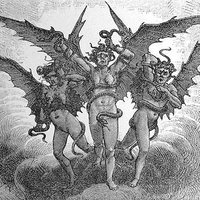
The Erinyes
CBUB Wins: 0
CBUB Losses: 0
CBUB Ties: 0
Win Percentage: 0%
Added by: Dinsdale Piranha
Read more about The Erinyes at: Wikipedia
Official Site: Public Domain
In Greek mythology the Erinyes (Ἐρινύες, pl. of Ἐρινύς, Erinys; literally "the avengers" from Greek ἐρίνειν "pursue, persecute" [sometimes referred to as "infernal goddesses" (Greek χθόνιαι θεαί)]) were female chthonic deities of vengeance. They were three netherworld goddesses. A formulaic oath in the Iliad invokes them as "those who beneath the earth punish whosoever has sworn a false oath". Burkert suggests they are "an embodiment of the act of self-cursing contained in the oath". They correspond to the Furies or Dirae in Roman mythology.
When the Titan Cronus castrated his father Uranus and threw his genitalia into the sea, the Erinyes emerged from the drops of blood, while Aphrodite was born from the crests of seafoam. According to variant accounts, they emerged from an even more primordial level—from Nyx, "Night". Their number is usually left indeterminate. Virgil, probably working from an Alexandria source, recognized three: Alecto ("unnameable" who appeared in Virgil's Aeneid), Megaera ("grudging"), and Tisiphone ("vengeful destruction"). Dante followed Virgil in depicting the same three-charactered triptych of Erinyes; in Canto IX of the Inferno they confront the poets at the gates of the city of Dis. The goddesses were servants of Hades and Persephone in the underworld where they watched criminals being tortured in the Dungeons of the Damned. The waists of the Erinyes were entwined with serpent (compare Gorgon) and their eyes dripped with blood, rendering their appearance rather horrific. Other depictions show them with the wings of a bat or bird and the body of a dog. When in human form, they are said to appear as mourners in long black robes or maidens in short skirts and boots.
In Aeschylus's Oresteia, the story is begun with Agamemnon's return home, to find that his wife, Clytemnestra, had married her lover, Aegisthus. Agamemnon was slain by his wife. When Orestes, their son, reached manhood, he was commanded by one of Apollo’s oracles to avenge his father‘s murder at his mother’s hand. Orestes hastened to follow Apollo’s orders. He returned home and revealed himself to his sister. However, he pretended to be a messenger bringing the news of his death and slew Clytemnestra. Although Orestes’ actions were what the god Apollo had commanded him to do, Orestes had still committed matricide and because of this, he was pursued by the terrible Erinyes. They chased him relentlessly and upon reaching Delphi he was told by Apollo that he should go to Athens to seek Athena's aid; he did so and she arranged a trial. The Erinyes appeared as Orestes’ accusers, while Apollo spoke in defence. He was acquitted and after this process the Erinyes were satisfied by Athena's mixture of bribes and veiled threats. At this point Athena led a procession accompanying them to their new abode, with the escort now addressing them as "Semnai" (Venerable Ones), as they will now be honored by the citizens of Athens and ensure the city's prosperity.
In Euripides' Orestes they are for the first time "equated" with the Eumenides (Εὐμενίδες, pl. of Εὐμενίς; literally "the gracious ones" but also translated as "Kindly Ones" )
CBUB Match Record:
No Regular Play Records Available
No Fantasy Draft Records Available
